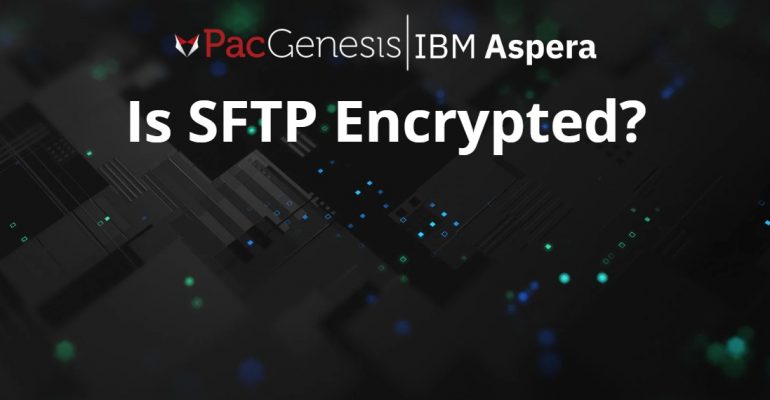Is SFTP Encrypted? Your 2025 Guide to SFTP Security!

Is SFTP Encrypted? Your 2025 Guide to SFTP Security!
TL;DR: Yes, SFTP is encrypted and secure for file transfers. SFTP uses SSH protocol with Advanced Encryption Standard (AES) encryption algorithm and SHA-2 hashing to protect data in transit. However, SFTP has compliance limitations including lack of centralized auditing, no native encryption at rest, and inability to prevent unauthorized third-party transfers. For businesses requiring enhanced security and compliance, solutions like IBM Aspera offer superior speed, security features, and built-in compliance capabilities beyond standard SFTP encryption.
Transferring files is a crucial part of business for most large companies. When it comes to transferring larger files or large volumes of files quickly, then businesses need to rely on something better than email or flash drives—especially in a remote world.
SFTP, or Secure Shell (SSH) File Transfer Protocol, is a network protocol that companies use to secure and send file transfers. SFTP encrypts everything being transferred over the SSH data stream. The authentication of the users, the actual files being transferred, and any part of the data intercepted will be unreadable because of the encryption.
To ensure security:
- SSH uses Advanced Encryption Standard (AES) to encrypt data. It leverages complex mathematics and the unique properties of numbers to encrypt data with a key.
- SSH uses a hashing algorithm, usually SHA-2, to determine data integrity. It processes the data through a hashing algorithm to identify if the data has been modified or not.
Disadvantages of SFTP
While SFTP encrypts its data, businesses may face a few roadblocks when trying to maintain compliance.
- SFTP doesn’t stop the unauthorized transfer of data to third parties. This can cause non-compliant disclosures of data, which breaches rules and laws on confidentiality and privacy
- Automation scripts and applications can sometimes expose data outside of the SFTP application. This provides an attack surface for hackers, and any data exposed breaches those compliance laws.
- SFTP does not include centralized audits or documentation. Most compliance frameworks require some documentation to demonstrate compliance. Without a centralized SFTP server documenting access across different systems can make documentation hard and raise red flags for assessors.
- SFTP doesn’t support native file and folder expiration needed for regulations and policies.
- SFTP doesn’t natively provide encryption at rest. This configuration must be made by an admin, which usually entails that it is being modified for other purposes.
How to Securely Transfer Files and Maintain Compliance
If you need to maintain compliance and regulations as part of your business, SFTP may not be enough. You may need a solution that offers speed, reliability, and security to safely transfer and manage data and files.
IBM Aspera is a file transfer suite of products that uses proprietary FASP technology to deliver files and data at maximum speeds. With Aspera, you get many benefits that standard SFTP software cannot offer:
- Speed – If you have a file that is 10 Gbps, it could take anywhere from 10-20 hours within the US. With Aspera, it only takes 8.4 seconds.
- Adaptability – Aspera uses the available bandwidth to transfer files without the expense of other network traffic. Its patented adaptive rate control ensures the right users are obtaining the right upload priority.
- Security – The FASP protocol offers built-in security for data transfers using the standard open-source OpenSSL toolkit. It also provides secure authentication of the transfer endpoints, on-the-fly encryption, and integrity verification for each transmitted datagram.
PacGenesis Helps Find Secure File Transfer Solutions
As a Gold Business Partner, PacGenesis helps businesses focus on scalable transfer and workflow solutions for their needs by implementing solutions like Aspera to maintain compliance. With over 10 years of experience in cybersecurity and data transfer solutions, we want to help find the best system to manage your internal process. Contact us today for a consultation to discuss what you have in place, what you’re looking for, and what will work best.




